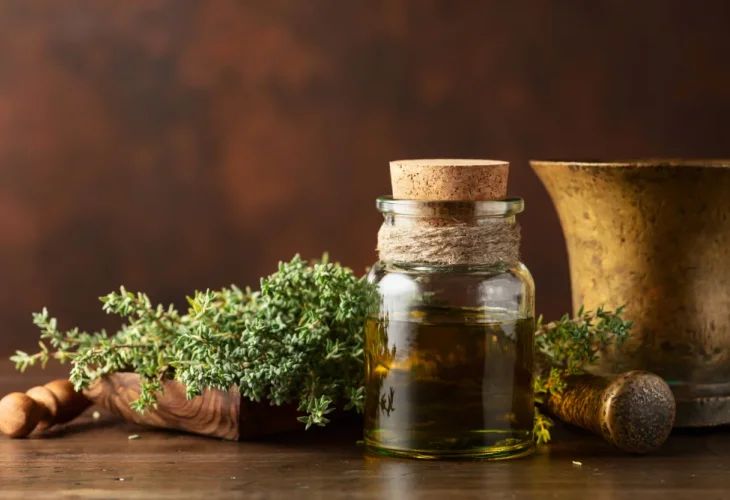Naturopathy and Natural Medicine
Thyme: Your Winter Wellness Secret
As temperatures fall and cold winds blow, we seek warmth and immune support. Discover the spice that can make dishes healthier, calm the soul, warm the body, and help protect against illness.

Thyme: The Ultimate Winter Herb
Winter is here. The temperatures drop, the cold winds blow, and suddenly everyone at home is sneezing, coughing, or dealing with seasonal illnesses like the flu or colds. This is precisely when our bodies need warmth and immune support the most. Enter thyme — a fragrant herb packed with health benefits that also elevates the flavors of our meals. Using thyme in cooking provides a deep and rich taste, along with natural warmth through its medicinal properties, making it the perfect winter herb.
Origins and Culinary Uses
Thyme, a member of the mint family, originates from the Mediterranean. Its green leaves are widely used to season a variety of dishes, especially stews, soups, and casseroles. Its delicate taste blends beautifully with vegetables, fish, meats, and even herbal teas.
In the winter, thyme adds much-needed warmth to dishes, making them especially nourishing. It can also be used in food preservation due to its antibacterial properties, offering extra protection to the food we consume during this season. Adding thyme to herbal teas gives them a pleasant aroma that creates a cozy and relaxing atmosphere at home.
Health Benefits of Thyme in the Winter
Winter is a time when our immune systems need extra support, and thyme is the perfect herb to provide it. Here are some of its key benefits:
1. Boosts Immune System
Thyme is rich in vitamin C, which helps the immune system fight common winter ailments like colds and the flu. Its active compounds, such as thymol, help protect the body’s cells from damage and enhance the body’s ability to recover from illnesses and infections. Vitamin C is also essential for energy production and maintaining healthy skin — especially important in winter when skin tends to dry out.
2. Effective Against Coughs and Colds
Thyme’s essential oils are known to improve respiratory symptoms. Thymol acts as an antiseptic and helps reduce throat irritation. A warm thyme tea is a natural and effective remedy for dry coughs or sore throats. Thyme can also be added to steam inhalations to relieve nasal congestion and promote easier breathing. The thyme-infused steam helps open the airways and soothe symptoms.
3. Antibacterial and Antiviral Properties
Thyme has antibacterial and antiviral qualities that help the body fight infections. You can prepare a natural throat wash with thyme to ease sore throats or use thyme oil to disinfect minor wounds and maintain home hygiene. Including thyme in daily meals can help prevent infections and reduce the spread of bacteria and viruses. Thyme oil, which contains active ingredients like carvacrol, can also be used to sanitize surfaces — an added benefit during winter when hygiene is vital.
4. Calming and Soothing Effects
If you're feeling stressed, thyme contains compounds that help calm the body and mind, making it an excellent choice for teas or comforting dishes. Its essential oils support muscle relaxation and tension release. A cup of thyme tea before bed may improve sleep quality and help with falling asleep more easily.
Why You Should Include Thyme in Your Winter Diet
Winter brings with it cold weather, increased illness susceptibility, and low energy, making thyme an excellent natural way to improve health and maintain body warmth throughout this season. Here are some ways to incorporate it into your diet:
Add thyme to hearty soups, casseroles with root vegetables, or calming herbal teas. It can also be added to warm water with lemon and honey — a great combination to strengthen the immune system and soothe the throat. Thyme pairs wonderfully with warm sauces made from olive oil, garlic, and lemon, offering both refreshing and warming qualities. Fresh thyme can also be added to pasta dishes with vegetables or to any recipe that needs deeper flavor.
Another tip is to add fresh thyme to chicken or fish roasts along with vegetables and other spices. The aroma of thyme adds depth and richness to the dish, enhancing its health benefits. You can place thyme sprigs inside the baking tray when preparing the chicken, infusing strong, aromatic flavors that elevate the entire dish.
You can also make homemade thyme butter by mixing soft butter with thyme leaves, a bit of salt, and crushed garlic, using it as a spread on fresh bread or as an addition to various dishes.

